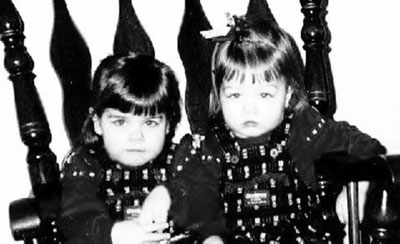All Nonfiction
- Bullying
- Books
- Academic
- Author Interviews
- Celebrity interviews
- College Articles
- College Essays
- Educator of the Year
- Heroes
- Interviews
- Memoir
- Personal Experience
- Sports
- Travel & Culture
All Opinions
- Bullying
- Current Events / Politics
- Discrimination
- Drugs / Alcohol / Smoking
- Entertainment / Celebrities
- Environment
- Love / Relationships
- Movies / Music / TV
- Pop Culture / Trends
- School / College
- Social Issues / Civics
- Spirituality / Religion
- Sports / Hobbies
All Hot Topics
- Bullying
- Community Service
- Environment
- Health
- Letters to the Editor
- Pride & Prejudice
- What Matters
- Back
Summer Guide
- Program Links
- Program Reviews
- Back
College Guide
- College Links
- College Reviews
- College Essays
- College Articles
- Back
What Does It Mean to be a Fraternal Twin?
“Which one of you is older?”
“Can you read each other's minds?”
“Can you feel each other’s pain?”
Fraternal twins aren’t superhuman beings with powers, but we do have our similarities and differences.
Fraternal twins develop from two separate eggs and sperm. This means some fraternal twins can look really similar, but others might look like they aren’t even related. Fraternal twins can also be the same gender or different genders. Fraternal twins have many similarities and differences that set them apart.
Maureen Healy, an expert on sensitive children and author of Growing Happy Kids says, “Twins have a special bond that forms in the womb. Oftentimes, this connection is subconscious — meaning it's below conscious awareness" (Maureen Healy 2018). The time fraternal twins spend in the womb together creates a close connection between them. My parents and other parents of twins when they were babies, find that they fall asleep, wake up, need to get fed, and need to get changed both at the same time. From my own experiences, my twin and I have to use the bathroom at the same times, we think the same things, we have similar opinions, and we can even sometimes feel how the other feels.
Personally, my twin brother and I, along with other fraternal twins are very, competitive with each other. We want to be better than the other at everything- video games, sports, even being the first to reach the bathroom to take a shower (although we have multiple bathrooms in our house). “The closer the age intervals are between siblings, the more competition there is,” says Alan E. Stewart, Ph.D., who researches birth order at the University of Georgia (Alan E. Stewart).
Fraternal twins are not the same person. They also have a lot of differences. My brother and I, for example, have very clashing personalities. My brother, being loud and obnoxious (no offense Beren) and myself being quieter and less obnoxious is an example of how different fraternal twins can be, yet they still have that unique bond. According to Olivia Wild, a fraternal twin and author, distance doesn’t seem to affect the twin bond and their relationship. Even if they haven’t spoken in a while, they can still feel each other’s emotions (Olivia Wild 2016).
Fraternal twins share only about 50 percent of their DNA which is just like any other brother and sister. Fraternal twins are as alike as any two siblings, they might look similar- having the same hair color, eye color, similar physical traits; or they might look very different like having different hair colors or eye colors.
Fraternal twins have a unique bond that connects them and their similarities. At the same time, they have many differences that set them apart. “Being a twin is like being born with a best friend” (Tricia Marrapodi).

Similar Articles
JOIN THE DISCUSSION
This article has 0 comments.
